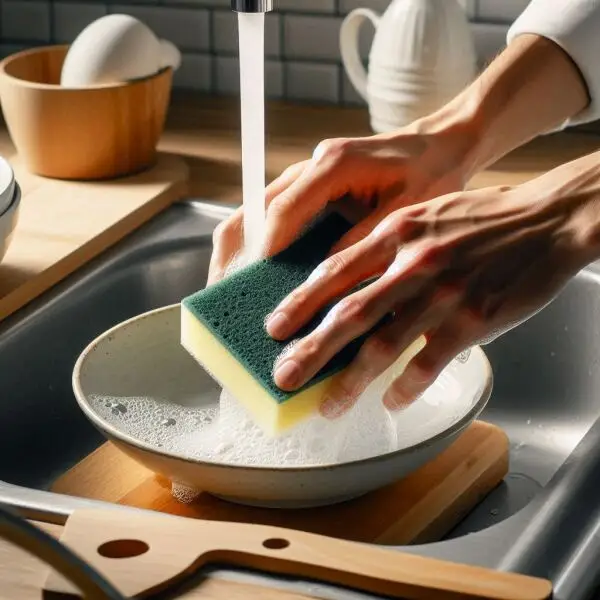When to change the kitchen sponge? Avoid bacteria now!
Did you know that the kitchen sponge can be a breeding ground for bacteria? Change it regularly to maintain hygiene and take care of your health!...
Table of Contents
- Kitchen Sponges: Friends or Enemies of Cleanliness
- The Bacterial Territory
- When to Say Goodbye to Your Sponge?
- Tips to Keep Bacteria at Bay
- Conclusion: The Battle of Cleanliness
Follow Patricia Alegsa on Pinterest!
Kitchen Sponges: Friends or Enemies of Cleanliness
Kitchen sponges are those tools that, although they seem harmless, can become real breeding grounds for bacteria.
Who hasn't thought at some point that their sponge is an ally in the battle against dirt?
But the truth can be a little more unsettling. So, if you've ever wondered why your sponge smells like "something it shouldn't," keep reading.
A study from Justus Liebig University in Germany reveals that kitchen sponges can harbor more bacteria than a toilet. Yes, you read that right! Among these bacteria, we find the mischievous E. coli and Salmonella, which can turn your kitchen into a risky place. Can you imagine your clean dishes having a touch of E. coli? No, thank you.
That's why it's crucial to know when and how to change your sponge. The general recommendation is to do it every 15 days, although this may vary depending on usage. If every time you clean your kitchen it feels like you're dragging a small zoo, it's time for a check-up.
Cleaning your home refrigerator: how often should you do it
Te tell you that there are clear signs that indicate your sponge has completed its cycle:
- **Separated fibers**: If you see that the sponge is falling apart like a sandcastle, it's time to change it.
The Bacterial Territory
A study from Justus Liebig University in Germany reveals that kitchen sponges can harbor more bacteria than a toilet. Yes, you read that right! Among these bacteria, we find the mischievous E. coli and Salmonella, which can turn your kitchen into a risky place. Can you imagine your clean dishes having a touch of E. coli? No, thank you.
That's why it's crucial to know when and how to change your sponge. The general recommendation is to do it every 15 days, although this may vary depending on usage. If every time you clean your kitchen it feels like you're dragging a small zoo, it's time for a check-up.
Cleaning your home refrigerator: how often should you do it
When to Say Goodbye to Your Sponge?
Te tell you that there are clear signs that indicate your sponge has completed its cycle:
- **Separated fibers**: If you see that the sponge is falling apart like a sandcastle, it's time to change it.
- **Discoloration**: If your sponge has lost its original color, it has probably also lost its cleaning ability.
- **Deformation**: If the sponge no longer has its shape or texture, it has become more of a pillow than a cleaning tool.
- **Bad smell**: Do you smell something weird? If the sponge seems like a failed chemistry experiment, it's time to dispose of it.
These are just a few of the signs you cannot ignore. You won't want your sponge to give you a "surprise" at the next dinner.
What is the best time of day to take a shower?
Tips to Keep Bacteria at Bay
To prevent your sponge from becoming a bacterial party, here are some tips:
1. **Rinse well**: After using it, rinse it with hot water. This helps eliminate some of the microorganisms.
2. **Disinfect**: You can put it in the microwave (damp) for one minute or boil it. Goodbye, little bugs!
3. **Store properly**: Let it dry after each use. A damp sponge is a magnet for bacteria.
4. **Change frequently**: Remember that every 15 days is ideal. Don’t put it off for later.
Key to health: wash your sheets weekly
Conclusion: The Battle of Cleanliness
Kitchen sponges are useful, but they can also be a trap if you don't give them the care they deserve.
Keeping them hygienic and changing them regularly is key to ensuring that your kitchen is a safe and clean place. So, the next time you're about to use your sponge, ask yourself this question: Is it my ally or my enemy? You decide!
Subscribe to the free weekly horoscope
Aquarius Aries Cancer Capricorn Gemini Leo Libra Pisces Sagittarius Scorpio Taurus Virgo
-
 Okinawa Diet: The Key to a Long and Healthy Life
Okinawa Diet: The Key to a Long and Healthy Life
Discover the Okinawa diet, known as the 'recipe for longevity.' With low-calorie foods and antioxidants, it promotes a long and healthy life. -
 Brain Diet: 7 Foods Against Dementia and Cognitive Decline
Brain Diet: 7 Foods Against Dementia and Cognitive Decline
Brain Diet: 7 Foods That Protect Your Memory and Prevent Cognitive Decline and Dementia. Experts Reveal Key Habits in Midlife. -
 Avoid these mistakes: Where NOT to store olive oil at home
Avoid these mistakes: Where NOT to store olive oil at home
Don't ruin olive oil: discover the ideal place to store it and preserve its flavor and nutritional benefits. Don't waste it! -
 Healthy and Delicious Drinks for Summer: Alternatives to Water
Healthy and Delicious Drinks for Summer: Alternatives to Water
5 healthy refreshments beyond water: Perfect for hot days, these drinks take care of your body without sacrificing flavor. Discover them and enjoy! -
 Ultra-processed foods could trigger early signs of Parkinson’s
Ultra-processed foods could trigger early signs of Parkinson’s
Do you eat a lot of ultra-processed foods? A study says that 11 servings a day could trigger the first symptoms of Parkinson’s. Do you dare to count yours?
I am Patricia Alegsa
I have been writing horoscope and self-help articles professionally for over 20 years.
Subscribe to the free weekly horoscope
Receive weekly in your email the horoscope and our new articles on love, family, work, dreams and more news. We do NOT send spam.
Astral and numerological analysis
-
 Discover your future, secret personality traits and how to improve in love, business and life in general
Discover your future, secret personality traits and how to improve in love, business and life in general
-
 Online Dream Interpreter: with artificial intelligence
Do you want to know what a dream you had means? Discover the power of understanding your dreams with our advanced online dream interpreter using artificial intelligence that responds to you in seconds.
Online Dream Interpreter: with artificial intelligence
Do you want to know what a dream you had means? Discover the power of understanding your dreams with our advanced online dream interpreter using artificial intelligence that responds to you in seconds.
-
 Loneliness: A Hidden Enemy of the Heart and the Immune System
Loneliness: A Hidden Enemy of the Heart and the Immune System
Loneliness increases the risk of stroke and heart problems. A Cambridge study reveals that social interaction strengthens the immune system. -
 Discover the Benefits of Deep Sleep: Necessary Hours and Key Factors
Discover the Benefits of Deep Sleep: Necessary Hours and Key Factors
Discover the benefits of deep sleep: necessary hours and key factors to improve your quality of life. Optimize your nighttime rest periods! -
 Salvia tea improves memory and controls blood sugar
Salvia tea improves memory and controls blood sugar
Discover the tea that improves memory and reduces blood sugar. This aromatic infusion can boost your cognitive health and control cholesterol. -
 Can rapamycin be the key to longevity? Find out more
Can rapamycin be the key to longevity? Find out more
Discover how rapamycin, an immunosuppressant, could be the key to delaying aging. Researchers explore its potential in longevity. -
 Insomnia and Academic Performance: Impact on Children and Adolescents
Insomnia and Academic Performance: Impact on Children and Adolescents
Discover how insomnia impacts academic performance in children and adolescents, affecting concentration, memory, and mood. Learn more here! -
 12 Simple Changes to Reset Your Overstimulated Nervous System
12 Simple Changes to Reset Your Overstimulated Nervous System
Social media, the foods we consume, the music we listen to, the thoughts we have: all these stimuli leave our nervous system unsettled. Here are innovative ways to avoid being so overstimulated. -
 Watch out for the mercury in the fish you eat! How to avoid it, which species to eat
Watch out for the mercury in the fish you eat! How to avoid it, which species to eat
All fish contain mercury, but only four should be avoided. Learn which ones they are and how to choose safe fish without complicating things. -
 Meet this actor who will drive you crazy!
Meet this actor who will drive you crazy!
Kellan Lutz combines overwhelming charisma with an enviable physique, dazzling blue eyes, and an irresistible smile. His humor and firmness in his opinions make him irresistibly sexy! -
 7 signs that your ex will eventually come back
7 signs that your ex will eventually come back
It's inevitable that after breaking up with someone you love, there comes a time when you wonder if the relationship is really over or if there's a chance that your ex is pretending to be over you. And if so, may the two of you get back together one day. -
 How to foster hope in the midst of chaos
How to foster hope in the midst of chaos
In times of uncertainty, may we run to the One who gives us life, not to the grocery store. -
 What does it mean to dream of blue colors?
What does it mean to dream of blue colors?
Do you know what it means to dream of blue colors? Discover how this tone influences your dreams and its possible relationship with your emotions and thoughts. -
 What does it mean to dream of vases?
What does it mean to dream of vases?
Discover the fascinating world of dreams with our guide on what it means to dream of vases. Learn about their symbolism and their meaning in different contexts. -
 What does it mean when a man kisses your forehead?
What does it mean when a man kisses your forehead?
A kiss on the forehead is a sign of tenderness and protection. Discover the beautiful meaning behind this very special and affectionate gesture.